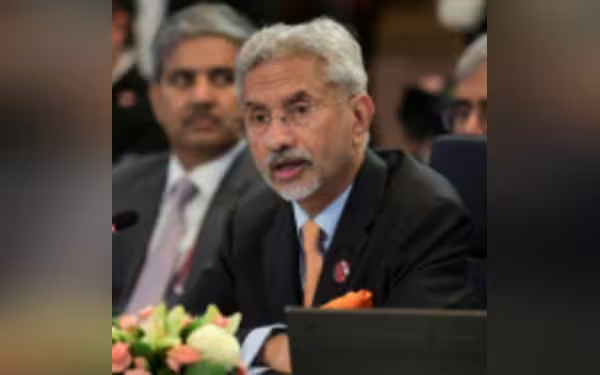Saturday, November 16, 2024 07:45 PM
Jaishankar Declares End of Uninterrupted Dialogue with Pakistan
- Jaishankar announces end of uninterrupted dialogue with Pakistan.
- India will respond to developments regarding Pakistan.
- Focus on Afghanistan's changing political landscape emphasized.
 Image Credits: pakobserver
Image Credits: pakobserverJaishankar announces the end of uninterrupted dialogue with Pakistan, emphasizing India's proactive stance on regional issues.
In a significant shift in diplomatic relations, India’s External Affairs Minister S. Jaishankar announced that the "era of uninterrupted dialogue" with Pakistan has come to an end. This statement marks a pivotal moment in the long-standing and often tumultuous relationship between the two neighboring countries. The announcement was made during the launch of a book titled "Strategic Conundrums: Reshaping India’s Foreign Policy" in New Delhi, where Jaishankar elaborated on India's stance towards Pakistan and other regional issues.
Jaishankar emphasized that India will respond to developments regarding Pakistan, whether they are positive or negative. He stated, "Actions have consequences. So far as Jammu and Kashmir is concerned, Article 370 is done." This reference to Article 370, which granted special status to Jammu and Kashmir, indicates a firm position from India regarding its territorial integrity and governance.
When discussing the future of India-Pakistan relations, Jaishankar posed a critical question: "What kind of relationship can we contemplate with Pakistan?" He assured that India is not a passive observer in this matter. He further added, "Whether events take a positive or a negative direction, either way, we will react." This statement underscores India's readiness to engage actively in its foreign policy, particularly concerning its immediate neighbors.
Shifting focus to Afghanistan, Jaishankar highlighted the importance of people-to-people relations between the two nations. He remarked, "Today after reviewing our Afghan policy, we are very clear-eyed about our interest… We must appreciate that Afghanistan with the presence of America is very different than Afghanistan without the presence of America." This insight reflects India's strategic considerations in the region, especially in light of the changing political landscape in Afghanistan.
On the topic of Bangladesh, Jaishankar noted, "It is natural we will deal with the government of the day." He acknowledged the political changes in Bangladesh and their potential to disrupt relations, emphasizing the need for mutual interests to guide diplomatic interactions. His comments suggest a pragmatic approach to foreign policy, recognizing the complexities of regional politics.
Jaishankar concluded by stating that for any country, neighbors are "always a conundrum," and major powers often have overlapping yet diverging interests. He pointed out that "Major powers will always have an agenda, which will overlap with us, but to differing degrees, also diverge." This observation highlights the intricate web of international relations and the challenges that come with navigating them.
In summary, Jaishankar's remarks signal a new chapter in India's foreign policy, particularly regarding its neighbors. The end of the "era of uninterrupted dialogue" with Pakistan suggests a more cautious and reactive approach moving forward. As regional dynamics continue to evolve, it remains to be seen how these changes will impact the broader geopolitical landscape in South Asia. Understanding these developments is crucial for anyone interested in the future of India-Pakistan relations and regional stability.













